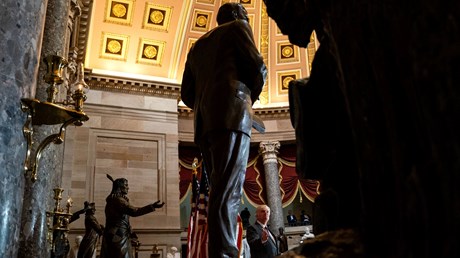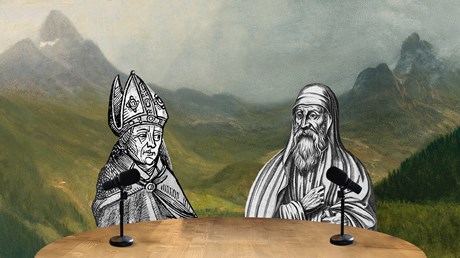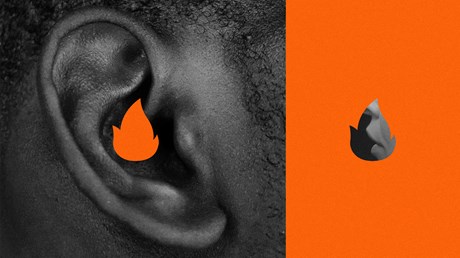Searched: Continue
News
In the uncanny valley of the shadow of data, we should fear no evil—and prepare for a very different future.
 This piece was adapted from Russell Moore’s newsletter. Subscribe here.In the past several weeks, two events occurred that are going to change our futures. One of them was the launching of OpenAI’s new artificial intelligence program, GPT-4o, just ahead of several competitors who will do the same in a matter of weeks. The other was the defrocking of a robot priest for teaching that baptisms could be done with Gatorade. I’m afraid the church is not ready for either.The more talked-about happening was the OpenAI announcement, complete with videos of the AI program laughing, seeming to blush, telling jokes, seeing and describing things in real time, and even singing songs made up on the spot (to whatever degree of emotion and enthusiasm was demanded).Far less culturally noticed was the fact that just a few weeks before, the Roman Catholic apologetics platform Catholic Answers reined in an AI chatbot called “Father Justin,” which was designed to help people through questions of doctrine and practice.People started to get upset when Father Justin started claiming to be an actual priest, capable of hearing confession and offering sacraments, and when it started giving unorthodox answers to questions, such as whether baptizing a baby with Gatorade would be all right in an emergency (the magisterium says no).Now Father Justin is just “Justin,” a “lay theologian.” Catholic Answers acknowledged to critics that they are pioneering a new technological landscape and learning—as the whole world will—just how difficult it is to keep an artificial intelligence orthodox. If my Catholic friends thought Martin Luther was bad, wait until the robots start posting theses to the ...Continue reading... This piece was adapted from Russell Moore’s newsletter. Subscribe here.In the past several weeks, two events occurred that are going to change our futures. One of them was the launching of OpenAI’s new artificial intelligence program, GPT-4o, just ahead of several competitors who will do the same in a matter of weeks. The other was the defrocking of a robot priest for teaching that baptisms could be done with Gatorade. I’m afraid the church is not ready for either.The more talked-about happening was the OpenAI announcement, complete with videos of the AI program laughing, seeming to blush, telling jokes, seeing and describing things in real time, and even singing songs made up on the spot (to whatever degree of emotion and enthusiasm was demanded).Far less culturally noticed was the fact that just a few weeks before, the Roman Catholic apologetics platform Catholic Answers reined in an AI chatbot called “Father Justin,” which was designed to help people through questions of doctrine and practice.People started to get upset when Father Justin started claiming to be an actual priest, capable of hearing confession and offering sacraments, and when it started giving unorthodox answers to questions, such as whether baptizing a baby with Gatorade would be all right in an emergency (the magisterium says no).Now Father Justin is just “Justin,” a “lay theologian.” Catholic Answers acknowledged to critics that they are pioneering a new technological landscape and learning—as the whole world will—just how difficult it is to keep an artificial intelligence orthodox. If my Catholic friends thought Martin Luther was bad, wait until the robots start posting theses to the ...Continue reading... |
The late evangelist is one of just four Americans who have received the nation's three highest congressional honors.
 Salvation in Christ Jesus was offered in National Statuary Hall May 16 at the unveiling of a statue of the iconic late global evangelist Billy Graham, which has John 3:16 and John 14:6 carved in its base.“Friends, God’s grace is undeserved, but through Christ it is freely given. And it is by trusting in God’s sacrifice that we are saved,” US Sen. Ted Budd (R-NC) said in the unveiling ceremony. “If you’ve not made a decision for yourself, I hope, I pray, that you will.”US House Speaker Mike Johnson (R-LA), North Carolina Gov. Roy Cooper and members of Graham’s family joined the North Carolina Congressional delegation in unveiling the statue that replaces that of early 20th-century North Carolina governor and staunch white supremacist Charles Aycock.“Today, we acknowledge that he is a better representation of our state than the statue it replaces, which brought memories of a painful history of racism,” Cooper said. “Not that Rev. Graham was perfect—he would have been the first to tell us that. … But he believed, as many of us do, that there is redemption, and he gave his life to remembering that message.”US Sen. Thom Tillis (R-NC) honored Graham as a trailblazer in race relations.“During an era in the 1950s when leaders in the South openly embraced segregation, it was Billy Graham who spoke out against it,” Tillis said, describing Graham as having been a staple in the Tillis family. “He insisted in his sermons that they be integrated. He shared his platform with Black ministers, including one named Martin Luther King Jr.“Rev. Graham was blessed with the gift that bridged differences,” Tillis said, “and brought ...Continue reading... Salvation in Christ Jesus was offered in National Statuary Hall May 16 at the unveiling of a statue of the iconic late global evangelist Billy Graham, which has John 3:16 and John 14:6 carved in its base.“Friends, God’s grace is undeserved, but through Christ it is freely given. And it is by trusting in God’s sacrifice that we are saved,” US Sen. Ted Budd (R-NC) said in the unveiling ceremony. “If you’ve not made a decision for yourself, I hope, I pray, that you will.”US House Speaker Mike Johnson (R-LA), North Carolina Gov. Roy Cooper and members of Graham’s family joined the North Carolina Congressional delegation in unveiling the statue that replaces that of early 20th-century North Carolina governor and staunch white supremacist Charles Aycock.“Today, we acknowledge that he is a better representation of our state than the statue it replaces, which brought memories of a painful history of racism,” Cooper said. “Not that Rev. Graham was perfect—he would have been the first to tell us that. … But he believed, as many of us do, that there is redemption, and he gave his life to remembering that message.”US Sen. Thom Tillis (R-NC) honored Graham as a trailblazer in race relations.“During an era in the 1950s when leaders in the South openly embraced segregation, it was Billy Graham who spoke out against it,” Tillis said, describing Graham as having been a staple in the Tillis family. “He insisted in his sermons that they be integrated. He shared his platform with Black ministers, including one named Martin Luther King Jr.“Rev. Graham was blessed with the gift that bridged differences,” Tillis said, “and brought ...Continue reading... |
What we can learn from the chronicler's stories about the kings of Israel.
 To the dutiful Bible reader, Chronicles might seem a bit baffling. As we read, we might find ourselves wondering, Haven’t I read this before? The short answer is yes and no . The books of 1 and 2 Chronicles retell some of the same stories of Israel and Judah that appear in the books of Samuel and Kings. But the chronicler also offers a fresh perspective on those years by incorporating new material and leaving other stories aside. His decision about what to keep and what to add is not arbitrary but intentional. And if we’re paying attention, we will find that the chronicler has a distinct message that we can learn from today.First, only 50 percent of Chronicles is repeated material from Samuel and Kings. On the one hand, that’s a lot of overlap. But on the other, that also means that half of Chronicles is brand new material. Which means we cannot afford to overlook it!And while the content of Chronicles overlaps with previous material, it emerged over 100 years later—giving the chronicler the benefit of hindsight and the opportunity to address a new set of challenges for his generation. The people of Judah had just returned from exile and were facing the massive task of rebuilding the temple of Yahweh in Jerusalem, which King Nebuchadnezzar had destroyed. This task profoundly shapes the backdrop to the books of Chronicles.If you set Chronicles side-by-side with Samuel and Kings, you’ll find that the new material focuses on two primary topics: David and the temple. The chronicler spends extra time on the genealogy of David’s family and the details of David’s legacy. And although Kings focuses on the northern kingdom of Israel, Chronicles highlights the southern ...Continue reading... To the dutiful Bible reader, Chronicles might seem a bit baffling. As we read, we might find ourselves wondering, Haven’t I read this before? The short answer is yes and no . The books of 1 and 2 Chronicles retell some of the same stories of Israel and Judah that appear in the books of Samuel and Kings. But the chronicler also offers a fresh perspective on those years by incorporating new material and leaving other stories aside. His decision about what to keep and what to add is not arbitrary but intentional. And if we’re paying attention, we will find that the chronicler has a distinct message that we can learn from today.First, only 50 percent of Chronicles is repeated material from Samuel and Kings. On the one hand, that’s a lot of overlap. But on the other, that also means that half of Chronicles is brand new material. Which means we cannot afford to overlook it!And while the content of Chronicles overlaps with previous material, it emerged over 100 years later—giving the chronicler the benefit of hindsight and the opportunity to address a new set of challenges for his generation. The people of Judah had just returned from exile and were facing the massive task of rebuilding the temple of Yahweh in Jerusalem, which King Nebuchadnezzar had destroyed. This task profoundly shapes the backdrop to the books of Chronicles.If you set Chronicles side-by-side with Samuel and Kings, you’ll find that the new material focuses on two primary topics: David and the temple. The chronicler spends extra time on the genealogy of David’s family and the details of David’s legacy. And although Kings focuses on the northern kingdom of Israel, Chronicles highlights the southern ...Continue reading... |
We can humbly seek their wisdom without treating them as mascots for one position or another.
 On September 11, 2020, I found myself under a large tent, where 51 ministers of the Reformed Presbyterian Church had assembled for a COVID-era presbytery. They gathered to receive charges against me, initiating an ecclesiastical trial. I had published a book that affirmed the possibility of theistic evolution—a view regarded by some as dangerous.Through that process, I became personally (and painfully) aware of how heated Genesis 1 controversies continue to be. My trial was ultimately dropped, but I was compelled to resign my pastorate and leave that denomination.I still love the Reformed Presbyterian Church and am grateful for my decades as a student and minister among its people. But I grieve that such passions for certain interpretations of Genesis 1 lead to damaged relationships and truncated ministries. It should not be so.There are already plenty of Genesis 1 studies on offer (including my own, called The Liturgy of Creation). But what the church really needs are more resources to help us engage these discussions more responsibly. Andrew J. Brown’s latest book, Recruiting the Ancients for the Creation Debate, is just such a resource.Brown, an Old Testament lecturer at Melbourne School of Theology, takes no sides on the question of whether the six days of creation are literal or figurative days. Recruiting the Ancients is not an attempt to solve creation controversies. Instead, it surveys what historic church authorities had to say on the subject, arguing that they shouldn’t be enlisted as straightforward allies of this or that contemporary position.The book is based on Brown’s earlier book on the same topic (The Days of Creation: A History of Christian Interpretation of Genesis 1:1–2:3), ...Continue reading... On September 11, 2020, I found myself under a large tent, where 51 ministers of the Reformed Presbyterian Church had assembled for a COVID-era presbytery. They gathered to receive charges against me, initiating an ecclesiastical trial. I had published a book that affirmed the possibility of theistic evolution—a view regarded by some as dangerous.Through that process, I became personally (and painfully) aware of how heated Genesis 1 controversies continue to be. My trial was ultimately dropped, but I was compelled to resign my pastorate and leave that denomination.I still love the Reformed Presbyterian Church and am grateful for my decades as a student and minister among its people. But I grieve that such passions for certain interpretations of Genesis 1 lead to damaged relationships and truncated ministries. It should not be so.There are already plenty of Genesis 1 studies on offer (including my own, called The Liturgy of Creation). But what the church really needs are more resources to help us engage these discussions more responsibly. Andrew J. Brown’s latest book, Recruiting the Ancients for the Creation Debate, is just such a resource.Brown, an Old Testament lecturer at Melbourne School of Theology, takes no sides on the question of whether the six days of creation are literal or figurative days. Recruiting the Ancients is not an attempt to solve creation controversies. Instead, it surveys what historic church authorities had to say on the subject, arguing that they shouldn’t be enlisted as straightforward allies of this or that contemporary position.The book is based on Brown’s earlier book on the same topic (The Days of Creation: A History of Christian Interpretation of Genesis 1:1–2:3), ...Continue reading... |
American Bible Society study finds majority don't trust technology with spiritual matters.
 Ask ChatGPT how to improve your spiritual life, and the natural-language processing artificial intelligence chatbot has plenty of suggestions.But Americans are skeptical that artificial intelligence, or AI, has much to offer in the way of reliable religious guidance.Sixty-eight percent of people don’t think AI could help them with their spiritual practices or “promote spiritual health,” according to the latest research from American Bible Society (ABS). Fifty-eight percent say they don’t think AI will “aid in moral reasoning” and only one out of every four people say they feel optimistic about the impact the technology will have.“Americans are more fearful than hopeful about artificial intelligence,” said John Farquhar Plake, an ABS program officer and editor-in-chief of the State of the Bible series. “People don’t know how AI will change the culture—but they’re mildly uneasy about it.”ABS surveyed about 2,500 people for its annual report on Scripture engagement and related topics. While technology has been a regular part of the survey, this is the first year ABS dedicated a set of questions to the topic of technology that performs tasks traditionally associated with human intelligence.AI is rapidly evolving, and currently includes everything from Amazon’s “virtual assistant” Alexa to chatbots running large language models that can pass the bar exam. People are pushing the technology further every day, and some Christians who work in tech are excited about the possibilities—dreaming of algorithms that might one day help people grow, learn, and go deeper in their faith.“It is not difficult to imagine how pastors and ...Continue reading... Ask ChatGPT how to improve your spiritual life, and the natural-language processing artificial intelligence chatbot has plenty of suggestions.But Americans are skeptical that artificial intelligence, or AI, has much to offer in the way of reliable religious guidance.Sixty-eight percent of people don’t think AI could help them with their spiritual practices or “promote spiritual health,” according to the latest research from American Bible Society (ABS). Fifty-eight percent say they don’t think AI will “aid in moral reasoning” and only one out of every four people say they feel optimistic about the impact the technology will have.“Americans are more fearful than hopeful about artificial intelligence,” said John Farquhar Plake, an ABS program officer and editor-in-chief of the State of the Bible series. “People don’t know how AI will change the culture—but they’re mildly uneasy about it.”ABS surveyed about 2,500 people for its annual report on Scripture engagement and related topics. While technology has been a regular part of the survey, this is the first year ABS dedicated a set of questions to the topic of technology that performs tasks traditionally associated with human intelligence.AI is rapidly evolving, and currently includes everything from Amazon’s “virtual assistant” Alexa to chatbots running large language models that can pass the bar exam. People are pushing the technology further every day, and some Christians who work in tech are excited about the possibilities—dreaming of algorithms that might one day help people grow, learn, and go deeper in their faith.“It is not difficult to imagine how pastors and ...Continue reading... |
By Dave DeCamp On Wednesday, Secretary of State Antony Blinken announced $2 billion in new military aid for Ukraine as Russian forces continue to advance...Blinken Announces $2 Billion in Military Aid for Ukraine as Russian Forces Advance
|
Our video Bible Class (just over 4 years old now) is currently focusing on the Book of Nehemiah. We are approaching Chapter 3 of the Memoirs of Nehemiah. There the 10 Gaes of Jerusalem are delineated … and as I teach the Chapter a spiritual truth (or principle) will be highlighted for each of those […]
|
Spiritual care is essential as stressors among law enforcement rise.
 Sitting in the front row of a supervisor training in 2016, Stamford Police Sgt. Sean Boeger raised his hand every time the instructor asked who had dealt with a particular experience, including homicides, fatal accidents, and child deaths.During his nearly 30 years as a police officer, 48-year-old Boeger had helped with body recovery efforts at Ground Zero after 9/11. When 20 children were killed by a lone shooter in 2012 at Sandy Hook Elementary School in Newtown, Connecticut, just 40 miles from Stamford, Boeger volunteered to help the small Newtown police department. He covered midnight shifts as officers took time to recover.The instructor at the training triggered something in Boeger. Until that class, he had never dwelt much on the effect of witnessing so much trauma. Driving home that evening, he also thought back to another incident, when he responded to a report of a small child falling out of an eighth-story window.“I felt overwhelmed, kind of panic-stricken,” he recalled of that evening. “I think I was more in shock from the stuff I’d never contemplated and the trauma impact it had on me. Because you don’t stop to think about it.”So Boeger did something he had never contemplated previously: He sought help from John Revell, a chaplain who had recently been spending time with his department.“I don’t know what’s going on with me, but I feel like I need to talk to you,” Boeger recalls telling Revell, whom he calls “the Rev.” Revell invited him over, interrupting his family dinnertime, and the two spent an hour or so talking. It opened the door to a longer-term relationship, and an eventual appreciation for the Rev’s consistent presence around ...Continue reading... Sitting in the front row of a supervisor training in 2016, Stamford Police Sgt. Sean Boeger raised his hand every time the instructor asked who had dealt with a particular experience, including homicides, fatal accidents, and child deaths.During his nearly 30 years as a police officer, 48-year-old Boeger had helped with body recovery efforts at Ground Zero after 9/11. When 20 children were killed by a lone shooter in 2012 at Sandy Hook Elementary School in Newtown, Connecticut, just 40 miles from Stamford, Boeger volunteered to help the small Newtown police department. He covered midnight shifts as officers took time to recover.The instructor at the training triggered something in Boeger. Until that class, he had never dwelt much on the effect of witnessing so much trauma. Driving home that evening, he also thought back to another incident, when he responded to a report of a small child falling out of an eighth-story window.“I felt overwhelmed, kind of panic-stricken,” he recalled of that evening. “I think I was more in shock from the stuff I’d never contemplated and the trauma impact it had on me. Because you don’t stop to think about it.”So Boeger did something he had never contemplated previously: He sought help from John Revell, a chaplain who had recently been spending time with his department.“I don’t know what’s going on with me, but I feel like I need to talk to you,” Boeger recalls telling Revell, whom he calls “the Rev.” Revell invited him over, interrupting his family dinnertime, and the two spent an hour or so talking. It opened the door to a longer-term relationship, and an eventual appreciation for the Rev’s consistent presence around ...Continue reading... |
Speech was not God's only miracle at Pentecost. The Spirit also gave the gift of understanding, overcoming division and contempt.
 Tongues of fire, everywhere. In this loud and furious age, a time of protests and counter-protests, words come burning, singeing, scalding, stinging.“Everyone should be quick to listen, slow to speak and slow to become angry,” James wrote, “because human anger does not produce the righteousness that God desires” (1:19–20). But few of us—even those of us who follow Christ—seem to believe that listening more than we speak could possibly meet the reality of these days.We give into the temptation of “thinking the times require using the tools of the enemy,” as Michael Wear says in The Spirit of Our Politics. We justify our tongues of fire as “just the way you play the game,” disregarding our trail of destruction—great forests put to waste by the sparks from our lips (3:5–8).Of course, there’s nothing new under the sun. Rage travels more quickly by gigahertz than messenger, but our era is not uniquely chaotic or tumultuous. The church has lived through worse, not least the dangerous early days after Christ’s resurrection and ascension.“[I’ve] been jailed … beaten up more times than I can count, and at death’s door time after time,” recounted the apostle Paul of his ministry in that time. “I’ve been flogged five times with the Jews’ thirty-nine lashes, beaten by Roman rods three times, pummeled with rocks once. … I’ve had to ford rivers, fend off robbers, struggle with friends, struggle with foes. I’ve been at risk in the city, at risk in the country, endangered by desert sun and sea storm, and betrayed by those I thought were my brothers” (2 Cor. 11:23–27, MSG). ...Continue reading... Tongues of fire, everywhere. In this loud and furious age, a time of protests and counter-protests, words come burning, singeing, scalding, stinging.“Everyone should be quick to listen, slow to speak and slow to become angry,” James wrote, “because human anger does not produce the righteousness that God desires” (1:19–20). But few of us—even those of us who follow Christ—seem to believe that listening more than we speak could possibly meet the reality of these days.We give into the temptation of “thinking the times require using the tools of the enemy,” as Michael Wear says in The Spirit of Our Politics. We justify our tongues of fire as “just the way you play the game,” disregarding our trail of destruction—great forests put to waste by the sparks from our lips (3:5–8).Of course, there’s nothing new under the sun. Rage travels more quickly by gigahertz than messenger, but our era is not uniquely chaotic or tumultuous. The church has lived through worse, not least the dangerous early days after Christ’s resurrection and ascension.“[I’ve] been jailed … beaten up more times than I can count, and at death’s door time after time,” recounted the apostle Paul of his ministry in that time. “I’ve been flogged five times with the Jews’ thirty-nine lashes, beaten by Roman rods three times, pummeled with rocks once. … I’ve had to ford rivers, fend off robbers, struggle with friends, struggle with foes. I’ve been at risk in the city, at risk in the country, endangered by desert sun and sea storm, and betrayed by those I thought were my brothers” (2 Cor. 11:23–27, MSG). ...Continue reading... |
As a physician, I witness countless first and last breaths. As a Christian, I am constantly reminded of how God breathes life into us through his Spirit.
 The scalpel sliced through the uterine wall. The amniotic sac ruptured, and fluid flowed across the blue surgical drapery toward me. The obstetrician’s fingers curled around the baby’s head while my gloved hands pressed firmly against the mother’s abdomen. The baby was larger than we had expected. I shifted my full body weight against the mother’s belly, and, at last, the newborn’s head slipped through. Her shoulders quickly followed, and there she lay, eyes taking in the bright world for the first time.Before she could cry, she took her first breath. Air rushed in, pushing aside fluid that had filled her lungs from six weeks of gestation. The oxygen diffused through the blood vessels of the alveoli, tiny air sacs within her lungs, relaxing the pulmonary arteries and allowing blood to course through her lungs for the first time. The short vessel connecting her lung arteries and heart began to close. Pressure built in her heart, causing the tiny hole between its chambers to snap shut.She breathed more vigorously than anyone else in the operating room, her purple hue softening to a rich pink. Squinting against the glaring light above, she cried again. What a foreign world this is—where air becomes breath, and then breath returns to air.Ruach is a Hebrew word meaning breath, wind, or spirit. (In the Septuagint, an ancient Greek translation of the Old Testament, it is rendered as pneuma or pneumon, the roots from which we get many English words pertaining to lungs.)In Genesis, ruach is both the Spirit of God bringing light and order into an unordered world (1:1–4) and the breath of life that God breathes into Adam (2:7). Psalm 33:6 says, “By the word of ...Continue reading... The scalpel sliced through the uterine wall. The amniotic sac ruptured, and fluid flowed across the blue surgical drapery toward me. The obstetrician’s fingers curled around the baby’s head while my gloved hands pressed firmly against the mother’s abdomen. The baby was larger than we had expected. I shifted my full body weight against the mother’s belly, and, at last, the newborn’s head slipped through. Her shoulders quickly followed, and there she lay, eyes taking in the bright world for the first time.Before she could cry, she took her first breath. Air rushed in, pushing aside fluid that had filled her lungs from six weeks of gestation. The oxygen diffused through the blood vessels of the alveoli, tiny air sacs within her lungs, relaxing the pulmonary arteries and allowing blood to course through her lungs for the first time. The short vessel connecting her lung arteries and heart began to close. Pressure built in her heart, causing the tiny hole between its chambers to snap shut.She breathed more vigorously than anyone else in the operating room, her purple hue softening to a rich pink. Squinting against the glaring light above, she cried again. What a foreign world this is—where air becomes breath, and then breath returns to air.Ruach is a Hebrew word meaning breath, wind, or spirit. (In the Septuagint, an ancient Greek translation of the Old Testament, it is rendered as pneuma or pneumon, the roots from which we get many English words pertaining to lungs.)In Genesis, ruach is both the Spirit of God bringing light and order into an unordered world (1:1–4) and the breath of life that God breathes into Adam (2:7). Psalm 33:6 says, “By the word of ...Continue reading... |
By calling or circumstance, millions in the “sandwich generation” feel the weight and cost of tending to aging relatives.
 Shanoah Bruner is among the quarter of American adults who find themselves in the “sandwich generation,” raising children under 18 and supporting aging parents.At her home in the Indianapolis suburbs, the 40-something mom lives with her husband, tween and teen daughters, mother-in-law, and biological father.The caretaking role comes naturally to Bruner. She was raised in a family that regularly opened their home to others and served their church and community. Plus, she worked in assisted living, memory care, and skilled nursing for over 20 years.“I grew up in a very Christian home where, you know, people meant more than possessions,” she said. “So that’s just how I look at it, and it’s definitely rewarding for me, though that’s not the case for everybody.”As baby boomers descend into their twilight years, their kids are taking them in or helping manage care from afar. Sixty-six percent of caregivers are women like Bruner, most of them in their mid-to-late 40s, who also work outside the home.The demanding needs of caregivers and their loved ones offer believers a chance to provide support and gospel hope. Churches, nonprofits, and government and parachurch organizations have resources, and individual Christians can provide personal, tangible love in action.In 2022, the first Bible study specifically for dementia caregivers was published. Some churches are implementing caregiver workshops. The Caregiving Support Network hosts a program to “sponsor a caregiver,” and there’s even a dedicated “Caregiver’s Prayer.”Richard Gentzler Jr., an expert in ministry for aging adults, paraphrased former First Lady Rosalynn Carter when he wrote that ...Continue reading... Shanoah Bruner is among the quarter of American adults who find themselves in the “sandwich generation,” raising children under 18 and supporting aging parents.At her home in the Indianapolis suburbs, the 40-something mom lives with her husband, tween and teen daughters, mother-in-law, and biological father.The caretaking role comes naturally to Bruner. She was raised in a family that regularly opened their home to others and served their church and community. Plus, she worked in assisted living, memory care, and skilled nursing for over 20 years.“I grew up in a very Christian home where, you know, people meant more than possessions,” she said. “So that’s just how I look at it, and it’s definitely rewarding for me, though that’s not the case for everybody.”As baby boomers descend into their twilight years, their kids are taking them in or helping manage care from afar. Sixty-six percent of caregivers are women like Bruner, most of them in their mid-to-late 40s, who also work outside the home.The demanding needs of caregivers and their loved ones offer believers a chance to provide support and gospel hope. Churches, nonprofits, and government and parachurch organizations have resources, and individual Christians can provide personal, tangible love in action.In 2022, the first Bible study specifically for dementia caregivers was published. Some churches are implementing caregiver workshops. The Caregiving Support Network hosts a program to “sponsor a caregiver,” and there’s even a dedicated “Caregiver’s Prayer.”Richard Gentzler Jr., an expert in ministry for aging adults, paraphrased former First Lady Rosalynn Carter when he wrote that ...Continue reading... |
By Dave DeCamp On Wednesday, Secretary of State Antony Blinken announced $2 billion in new military aid for Ukraine as Russian forces continue to advance...Blinken Announces $2 Billion in Military Aid for Ukraine as Russian Forces Advance
|
? Temple Baptist Church - 5-15-2024John 16:7-15? Introduction:? A. Once again, let me reiterate that this will not be a Systematic Theology study of Pneumatology. But because of the context found in John 14-16, we find some important things about the Person and Word of the Holy Spirit. The Person is the Holy Spirit and when speaking of the work of the Holy Spirit, the name the Holy Ghost is used.? B. Last week, I “scratched the surface” on two things: the Work of the Comforter to the comfortless. The disciples' hearts were “filled with sorrow.” Two words need to be explained: Comforter and comfortless:? 1. Comforter (παράκλητος? paraklētos? par-ak'-lay-tos)? in the Greek means to be summoned to the side of or to come to the aid of the comfortless. Our Lord said that it was “expedient” that He went away but would pray the Father to send the Comforter in Christ's stead. While Christ comforted the disciples for 3 ½ years, the Comforter would abide with them forever.? John 14:16 And I will pray the Father, and he shall give you another Comforter, that he may abide with you for ever;? 2. Comfortless in the Greek comes from the word Greek word? ὀρφανός? orphanos? or-fan-os'? from which we get our English word orphan. Orphans have no families but the child of God has a spiritual family: our Father which is in heaven; our Saviour and Friend who love us; and the Holy Spirit that indwells us. Aren't you glad that you are not an orphan.? John 14:18 I will not leave you comfortless: I will come to you.? Psalms 27:10 When my father and my mother forsake me, then the LORD will take me up.? All of our sorrows, come what may! Death, sickness, persecutions, trials and tribulations, personal failure, discouragement, disappointment, defilement, both real and imagined. He will not leave us comfortless: orphaned!? C. The Second name given to the Holy Spirit is the “Spirit of truth,” which I will look at in a little more detail tonight.? John 14:17 Even the Spirit of truth; whom the world cannot receive, because it seeth him not, neither knoweth him: but ye know him; for he dwelleth with you, and shall be in you.? D. Why do people not get saved and why do some saved never grow? The verses that we read to night are the problem.? 1. There are those who reject Christ CANNOT know the truth. “seeth him not … neither knoweth him”? 1 Corinthians 2:11-14 For what man knoweth the things of a man, save the spirit of man which is in him? even so the things of God knoweth no man, but the Spirit of God. (12) Now we have received, not the spirit of the world, but the spirit which is of God; that we might know the things that are freely given to us of God. (13) Which things also we speak, not in the words which man's wisdom teacheth, but which the Holy Ghost teacheth; comparing spiritual things with spiritual. (14) But the natural man receiveth not the things of the Spirit of God: for they are foolishness unto him: neither can he know them, because they are spiritually discerned.? 2. Both lost and the carnal saint oft times who reject the Bible CANNOT know the truth! The truth is available in our day.? Zechariah 7:11-12 But they refused to hearken, and pulled away the shoulder, and stopped their ears, that they should not hear. (12) Yea, they made their hearts as an adamant stone, lest they should hear the law, and the words which the LORD of hosts hath sent in his spirit by the former prophets: therefore came a great wrath from the LORD of hosts.? Acts 7:54-57 When they heard these things, they were cut to the heart, and they gnashed on him with their teeth. (55) But he, being full of the Holy Ghost, looked up stedfastly into heaven, and saw the glory of God, and Jesus standing on the right hand of God, (56) And said, Behold, I see the heavens opened, and the Son of man standing on the right hand of God. (57) Then they cried out with a loud voice, and stopped their ears, and ran upon him with one accord,? E. The Work of the Spirit of Truth:? 1. Verse 8.? John 16:8 And when he is come, he will reprove the world of sin, and of righteousness, and of judgment:? a.? The Holy Spirit teaches us about Sin.? John 16:9 Of sin, because they believe not on me;? 1)? The Truth about Adamic Sin.? Romans 5:12a Wherefore, as by one man sin entered into the world, and death by sin;? Psalms 58:3 The wicked are estranged from the womb: they go astray as soon as they be born, speaking lies.? 2) The Truth about Willful Sin.? Romans 5:12b and so death passed upon all men, for that all have sinned:? Romans 3:23 For all have sinned, and come short of the glory of God;? 3) The Truth about Recompense for Sin.? a) Temporal Recompense.? Romans 6:23 For the wages of sin is death; but the gift of God is eternal life through Jesus Christ our Lord.? b) Eternal Sense. Revelation 20:15 And whosoever was not found written in the book of life was cast into the lake of fire.? b. The Holy Spirit teaches us about Righteousness.? John 16:10 Of righteousness, because I go to my Father, and ye see me no more;? 1) Lack of Righteousness of the Sinner.? Isaiah 64:6 But we are all as an unclean thing, and all our righteousnesses are as filthy rags; and we all do fade as a leaf; and our iniquities, like the wind, have taken us away.? 2) Perfect Righteousness of the Saviour.? Romans 10:3-4 For they being ignorant of God's righteousness, and going about to establish their own righteousness, have not submitted themselves unto the righteousness of God. (4) For Christ is the end of the law for righteousness to every one that believeth.? 3) Imputed Righteousness of the Saint.? Romans 4:20-25 He staggered not at the promise of God through unbelief; but was strong in faith, giving glory to God; (21) And being fully persuaded that, what he had promised, he was able also to perform. (22) And therefore it was imputed to him for righteousness. (23) Now it was not written for his sake alone, that it was imputed to him; (24) But for us also, to whom it shall be imputed, if we believe on him that raised up Jesus our Lord from the dead; (25) Who was delivered for our offences, and was raised again for our justification.? 3. The Holy Spirit teaches us about Judgment.? John 16:11 Of judgment, because the prince of this world is judged.? a) The Judgment of Satan and fallen angels. Matthew 25:41 Then shall he say also unto them on the left hand, Depart from me, ye cursed, into everlasting fire, prepared for the devil and his angels:? Revelation 20:10 And the devil that deceived them was cast into the lake of fire and brimstone, where the beast and the false prophet are, and shall be tormented day and night for ever and ever.? b) The Judgment of Sinners and their works.? Revelation 20:11-15 And I saw a great white throne, and him that sat on it, from whose face the earth and the heaven fled away; and there was found no place for them. (12) And I saw the dead, small and great, stand before God; and the books were opened: and another book was opened, which is the book of life: and the dead were judged out of those things which were written in the books, according to their works. (13) And the sea gave up the dead which were in it; and death and hell delivered up the dead which were in them: and they were judged every man according to their works. (14) And death and hell were cast into the lake of fire. This is the second death. (15) And whosoever was not found written in the book of life was cast into the lake of fire.? 2. Verse 12-13.? John 16:12-13 I have yet many things to say unto you, but ye cannot bear them now. (13) Howbeit when he, the Spirit of truth, is come, he will guide you into all truth: for he shall not speak of himself; but whatsoever he shall hear, that shall he speak: and he will shew you things to come.? a. In Depth Teaching. “he will guide you into all truth”? Colossians 1:9 For this cause we also, since the day we heard it, do not cease to pray for you, and to desire that ye might be filled with the knowledge of his will in all wisdom and spiritual understanding;? b. In Inspired Revelation. “and he will shew you things to come.” The canon of Scripture was not Plenary until after the death of the Apostles as they would continue to write under the inspiration of God in their lives. After their death, the canon of Scripture was Plenary, complete.? 2 Peter 1:21 For the prophecy came not in old time by the will of man: but holy men of God spake as they were moved by the Holy Ghost.? c. In Prophecy. Eschatology. Things to come. Knowing what the future holds and Who holds the future, we can face tomorrow and all our tomorrows in faith confidence through faith. “I do not know what tomorrow holds, but I know Who holds tomorrow and Who holds my life in His hands!”? Romans 8:38-39 For I am persuaded, that neither death, nor life, nor angels, nor principalities, nor powers, nor things present, nor things to come, (39) Nor height, nor depth, nor any other creature, shall be able to separate us from the love of God, which is in Christ Jesus our Lord.? ? 3. Verse 14. John 16:14 He shall glorify me: for he shall receive of mine, and shall shew it unto you.? a. The Holy Spirit does not speak of or exalt Himself. Be careful around people who constantly speak of the Holy Spirit or Holy Ghost.? b. The Holy spirit ALWAYS glorifies the Saviour and not Himself! We certainly honor and love Him, but He only speaks of and directs us to our Lord.
|
 The coming days and weeks will likely include a lot of political drama, while in the background, IDF soldiers continue to fight in Gaza, and 100,000 Israelis remain away from their homes.? The coming days and weeks will likely include a lot of political drama, while in the background, IDF soldiers continue to fight in Gaza, and 100,000 Israelis remain away from their homes.? |
The highlife musician challenged the materialism and extortion he encountered too often in the church.
 Kofi Owusu Dua-Anto, a Ghanaian gospel musician who challenged church leaders with his catchy songs, died last month age 45. Known professionally as KODA, the artist passed away suddenly on April 21 after a yet-undisclosed short illness.KODA won awards for his vocal and musical finesse and production skills, but he used the platform his music offered him to speak out against the materialism and self-promotion he believed had overtaken his country’s church leaders.“What is being preached from the pulpit? If it’s just the aesthetics of Christianity … the flashy things of how the man of God has visited 20 churches in the UK or the US and how he stood in T. D. Jakes’s church … if that’s the vision … then that’s what [Christians will] chase,” he said in 2021.In 2013, KODA put these concerns to music when he released “Nsem Pii” (“Many Issues”).“Fifteen ways to be successful, 13 ways to make much money, but the one way to make to heaven, preacher man, you don’t preach about it,” he sang in both Twi, a Ghanian local language, and English. “Listen, last Sunday I heard you preach; I must confess, I was confused, was that church of GIMPA?” (GIMPA or Ghana Institute of Management and Public Administration, is a prestigious public university in Ghana.)The track surprised many in the local Christian community, one that traditionally practiced unquestioned reverence toward pastors and church leaders, and the gospel music industry, which generally only sang about God and commented little on culture.KODA credited the Bible as his inspiration for his lyrics.“I was reading the Acts of the Apostles from [chapters] 1 to ...Continue reading... Kofi Owusu Dua-Anto, a Ghanaian gospel musician who challenged church leaders with his catchy songs, died last month age 45. Known professionally as KODA, the artist passed away suddenly on April 21 after a yet-undisclosed short illness.KODA won awards for his vocal and musical finesse and production skills, but he used the platform his music offered him to speak out against the materialism and self-promotion he believed had overtaken his country’s church leaders.“What is being preached from the pulpit? If it’s just the aesthetics of Christianity … the flashy things of how the man of God has visited 20 churches in the UK or the US and how he stood in T. D. Jakes’s church … if that’s the vision … then that’s what [Christians will] chase,” he said in 2021.In 2013, KODA put these concerns to music when he released “Nsem Pii” (“Many Issues”).“Fifteen ways to be successful, 13 ways to make much money, but the one way to make to heaven, preacher man, you don’t preach about it,” he sang in both Twi, a Ghanian local language, and English. “Listen, last Sunday I heard you preach; I must confess, I was confused, was that church of GIMPA?” (GIMPA or Ghana Institute of Management and Public Administration, is a prestigious public university in Ghana.)The track surprised many in the local Christian community, one that traditionally practiced unquestioned reverence toward pastors and church leaders, and the gospel music industry, which generally only sang about God and commented little on culture.KODA credited the Bible as his inspiration for his lyrics.“I was reading the Acts of the Apostles from [chapters] 1 to ...Continue reading... |
For all his greatness, we should most seek to imitate the late pastor's humility and indifference to fame.
 In spring of last year, many of us saw a photo of the late Timothy Keller sitting on a park bench. The photo was used on the cover of Collin Hansen’s biography of Keller, and it circulated around the internet in May when he passed away—on social media, blogs, and even Keller’s personal website.What most of us didn’t see, however, was the banana peel lying on the bench only a couple feet from Keller. The peel has been cropped from most versions of the photo, and understandably so. Who wants to see an ugly brown bit of organic waste in an author’s photograph?I confess that if I were a world-famous pastor and best-selling author having my picture taken by a professional photographer, I would most certainly have moved the banana peel before someone took my picture. Who wouldn’t? But Keller didn’t seem to care.I believe this points to a deeper character trait of Keller’s, which many observed during his lifetime of ministry: an indifference to fame and to curating an image—something many of us struggle with in the social media era. This is also part of why, I believe, he finished his race so well.Finishing well in life and ministry has been historically difficult for believers, especially for those in positions of leadership. Think of Gideon or Solomon in the Old Testament, Demas in the New Testament, or, of course, the many church leaders today who have infamously failed to persevere.The esteem that leaders receive from the Christian community can allow for hidden flaws to grow like rust on the hull of a ship, unnoticed and unaddressed at first. But as these leaders reach greater influence, greater weight is placed on these flaws—which can reach ...Continue reading... In spring of last year, many of us saw a photo of the late Timothy Keller sitting on a park bench. The photo was used on the cover of Collin Hansen’s biography of Keller, and it circulated around the internet in May when he passed away—on social media, blogs, and even Keller’s personal website.What most of us didn’t see, however, was the banana peel lying on the bench only a couple feet from Keller. The peel has been cropped from most versions of the photo, and understandably so. Who wants to see an ugly brown bit of organic waste in an author’s photograph?I confess that if I were a world-famous pastor and best-selling author having my picture taken by a professional photographer, I would most certainly have moved the banana peel before someone took my picture. Who wouldn’t? But Keller didn’t seem to care.I believe this points to a deeper character trait of Keller’s, which many observed during his lifetime of ministry: an indifference to fame and to curating an image—something many of us struggle with in the social media era. This is also part of why, I believe, he finished his race so well.Finishing well in life and ministry has been historically difficult for believers, especially for those in positions of leadership. Think of Gideon or Solomon in the Old Testament, Demas in the New Testament, or, of course, the many church leaders today who have infamously failed to persevere.The esteem that leaders receive from the Christian community can allow for hidden flaws to grow like rust on the hull of a ship, unnoticed and unaddressed at first. But as these leaders reach greater influence, greater weight is placed on these flaws—which can reach ...Continue reading... |
For seven seasons, the show has offered a clichéd (and nostalgic) vision of how atheists and believers relate to each other.
 My mom was the one who told me to watch The Big Bang Theory. It was a show about nerds—and I was a nerd. She thought I’d enjoy it. A friend had already mentioned that the main character, Sheldon Cooper, was “exactly like” me. After I watched the show, at Mom’s encouragement, I joked that I had mixed feelings about the comparison.The Big Bang Theory was extremely popular and not just with my mom; at its height, it averaged 20 million viewers a night. But it never really resonated with actual dweebs. Its audience was largely Gen X women—not people who were Sheldon but people who “knew a Sheldon,” not the geeks themselves but their mothers and friends.It’s fitting, then, that the even-more-popular Big Bang spinoff would be Young Sheldon, a prequel about the title character’s childhood in East Texas—and that Sheldon’s relationship with his mom, Mary, would be at the heart of the show. Young Sheldon sits at the top of the prime-time rankings; one recent week, the show (which streams on Netflix, Max, and Paramount+) topped all streamed content across US household televisions.As Young Sheldon comes to an end (its series finale airs May 16; a spinoff starring two breakout characters—Georgie and Mandy—has already been announced), so too does the onscreen dynamic between Sheldon and Mary. So too does a nostalgic vision for how the “science vs. religion” debate plays out in our families.Mary is Sheldon’s opposite in nearly every way. He’s a logical atheist physicist with no people skills; Mary is a warm, folksy conservative Christian. In many ways, she serves as an audience surrogate. (For what it’s worth, Mary was my ...Continue reading... My mom was the one who told me to watch The Big Bang Theory. It was a show about nerds—and I was a nerd. She thought I’d enjoy it. A friend had already mentioned that the main character, Sheldon Cooper, was “exactly like” me. After I watched the show, at Mom’s encouragement, I joked that I had mixed feelings about the comparison.The Big Bang Theory was extremely popular and not just with my mom; at its height, it averaged 20 million viewers a night. But it never really resonated with actual dweebs. Its audience was largely Gen X women—not people who were Sheldon but people who “knew a Sheldon,” not the geeks themselves but their mothers and friends.It’s fitting, then, that the even-more-popular Big Bang spinoff would be Young Sheldon, a prequel about the title character’s childhood in East Texas—and that Sheldon’s relationship with his mom, Mary, would be at the heart of the show. Young Sheldon sits at the top of the prime-time rankings; one recent week, the show (which streams on Netflix, Max, and Paramount+) topped all streamed content across US household televisions.As Young Sheldon comes to an end (its series finale airs May 16; a spinoff starring two breakout characters—Georgie and Mandy—has already been announced), so too does the onscreen dynamic between Sheldon and Mary. So too does a nostalgic vision for how the “science vs. religion” debate plays out in our families.Mary is Sheldon’s opposite in nearly every way. He’s a logical atheist physicist with no people skills; Mary is a warm, folksy conservative Christian. In many ways, she serves as an audience surrogate. (For what it’s worth, Mary was my ...Continue reading... |
The wager only scratches the surface of his relevance to a post-Christian era.
 It is a common lament that we live in a post-Christian era. This fact raises challenges to our witness to the world. Most of our audience thinks that, in G. K. Chesterton’s words, Christianity has been tried and found wanting (rather than found wanting and left untried). It is not considered a live option. How do we bear witness well in this cultural context? We might do well to reconsider one of the most enigmatic thinkers in Christian history, Blaise Pascal.Pascal suffers from a public relations problem. As the source of Pascal’s wager, he is often considered a gambling man. He urges the non-believer to bet that God exists. What does one have to lose? In Beyond the Wager: The Christian Brilliance of Blaise Pascal, philosopher Douglas Groothuis shows that there is more to Pascal’s life and thought than his most famous argument. Groothuis demonstrates that we have much to learn from this brilliant thinker. Pascal, he argues, is a crucial thinker for our time.Essential writingsPascal came on the scene in the 17th century, during the early years of the Scientific Revolution. Several of his works contributed to this movement, including treatises on the geometry of conic sections, theories of probability, and conclusions to extensive experiments he had done to test the possibility of a vacuum. He invented the first functional calculator, which he had built to help his father with his work of assessing taxes.His best-known works, however, focus on Christianity. In the Provincial Letters, Pascal defends the Jansenist movement, which was condemned by the Catholic church, against the Jesuits. The Jansenists emphasized that the depth of human sinfulness required a work of God for our salvation. The Christian life ...Continue reading... It is a common lament that we live in a post-Christian era. This fact raises challenges to our witness to the world. Most of our audience thinks that, in G. K. Chesterton’s words, Christianity has been tried and found wanting (rather than found wanting and left untried). It is not considered a live option. How do we bear witness well in this cultural context? We might do well to reconsider one of the most enigmatic thinkers in Christian history, Blaise Pascal.Pascal suffers from a public relations problem. As the source of Pascal’s wager, he is often considered a gambling man. He urges the non-believer to bet that God exists. What does one have to lose? In Beyond the Wager: The Christian Brilliance of Blaise Pascal, philosopher Douglas Groothuis shows that there is more to Pascal’s life and thought than his most famous argument. Groothuis demonstrates that we have much to learn from this brilliant thinker. Pascal, he argues, is a crucial thinker for our time.Essential writingsPascal came on the scene in the 17th century, during the early years of the Scientific Revolution. Several of his works contributed to this movement, including treatises on the geometry of conic sections, theories of probability, and conclusions to extensive experiments he had done to test the possibility of a vacuum. He invented the first functional calculator, which he had built to help his father with his work of assessing taxes.His best-known works, however, focus on Christianity. In the Provincial Letters, Pascal defends the Jansenist movement, which was condemned by the Catholic church, against the Jesuits. The Jansenists emphasized that the depth of human sinfulness required a work of God for our salvation. The Christian life ...Continue reading... |
The Wall Street Journal is raising concern over declining global birth rates, which experts predict will dip below the replacement rate, 2.2, for the first time in human history. “The world is at a startling demographic milestone,” the outlet? reported in a May 13 feature piece. “Sometime soon, the global fertility rate will drop below the […]The post Birth Rates Will Drop Below Replacement Rate for First Time as Underpopulation Crisis Continues appeared first on LifeNews.com.
|
Māori Christians in New Zealand bristle at newly translated portions of the Bible that use the names of local deities.
 Last year, Bible Society New Zealand (BSNZ) released a 109-page booklet with 10 Bible passages published in a contemporary Māori translation for the first time. The version used the names of atua Māori, or Māori gods and deities, in place of words like heaven, earth, land, and sea. Genesis 1:1, for example, says that in the beginning, God made Rangi-nui (Sky Father) and Papatūānuku (Earth Mother) instead of rangi and whenua respectively.The changes, meant to appeal to younger Māori, stirred debate. While some readers praised the changes (“The terms are more relatable,” wrote one respondent in a BSNZ survey), many, including Māori theologians and church leaders, decried the use of atua Māori in the Scriptures as “twisted” and “blasphemous.”The aim of publishing He Tīmatanga (A Beginning) was not to present a final translation but to offer a draft for feedback, said Clare Knowles, translation coordinator at BSNZ. Publishing these passages was part of an effort that began in 2008 to “retranslate the entire Bible into Māori [in] today’s language.”While Māori speakers in New Zealand have a Bible translation in their language, it was last revised in 1952. The most recent edition in 2012 mainly focused on reformatting the text with updated paragraphs, spelling, and punctuation, but the content has largely remained the same since missionaries first translated the Bible into Māori in the 19th century.“Imagine if the only English translation we had was the King James Version. … This is a bit like the situation with Te Paipera Tapu, the Māori Bible,” Knowles wrote in an article promoting He Tīmatanga.In New Zealand, about 8 percent of the population speak Māori, ...Continue reading... Last year, Bible Society New Zealand (BSNZ) released a 109-page booklet with 10 Bible passages published in a contemporary Māori translation for the first time. The version used the names of atua Māori, or Māori gods and deities, in place of words like heaven, earth, land, and sea. Genesis 1:1, for example, says that in the beginning, God made Rangi-nui (Sky Father) and Papatūānuku (Earth Mother) instead of rangi and whenua respectively.The changes, meant to appeal to younger Māori, stirred debate. While some readers praised the changes (“The terms are more relatable,” wrote one respondent in a BSNZ survey), many, including Māori theologians and church leaders, decried the use of atua Māori in the Scriptures as “twisted” and “blasphemous.”The aim of publishing He Tīmatanga (A Beginning) was not to present a final translation but to offer a draft for feedback, said Clare Knowles, translation coordinator at BSNZ. Publishing these passages was part of an effort that began in 2008 to “retranslate the entire Bible into Māori [in] today’s language.”While Māori speakers in New Zealand have a Bible translation in their language, it was last revised in 1952. The most recent edition in 2012 mainly focused on reformatting the text with updated paragraphs, spelling, and punctuation, but the content has largely remained the same since missionaries first translated the Bible into Māori in the 19th century.“Imagine if the only English translation we had was the King James Version. … This is a bit like the situation with Te Paipera Tapu, the Māori Bible,” Knowles wrote in an article promoting He Tīmatanga.In New Zealand, about 8 percent of the population speak Māori, ...Continue reading... |
A new book seems oddly outraged that CRT skeptics take its arguments seriously.
 Last year I joined a group of Christian leaders, Black and white, on a tour of the National Museum of African American History and Culture located in Washington, DC.Even though I’ve read quite a bit about slavery and Jim Crow, I was still physically and emotionally disturbed by the visual depictions of the systemic and violent ways in which people of color were treated for centuries of American history. There is no sugarcoating this history. It was (and is) an offense against God, with ripple effects that continue to shape our national life.In the past decade, conversations on racism have become more heated, reaching a fever pitch in 2020 with the killing of George Floyd at the hands of a Minneapolis police officer.One outcome of the resulting ferment of protest and denunciation was renewed attention to critical race theory (popularly known as CRT), a controversial legal theory once confined to the academic world and now increasingly mainstreamed and popularized in public life, including many of our leading institutions.Books like White Fragility by Robin DiAngelo or How to Be an Antiracist by Ibram X. Kendi rose to the top of bestseller lists in 2020 and after. Corporations, government entities, and even churches began implementing steps drawn from these and other popular works. Evangelical publishers churned out books in this spirit as well.Some Christian leaders have defended the use of CRT as a helpful analytical tool. Others have criticized it as a totalizing worldview opposed to biblical Christianity. This debate has divided many Christians, exhausted many pastors, split many organizations, and convulsed our politics.Seeking to bring sanity and clarity to this ongoing conversation is ...Continue reading... Last year I joined a group of Christian leaders, Black and white, on a tour of the National Museum of African American History and Culture located in Washington, DC.Even though I’ve read quite a bit about slavery and Jim Crow, I was still physically and emotionally disturbed by the visual depictions of the systemic and violent ways in which people of color were treated for centuries of American history. There is no sugarcoating this history. It was (and is) an offense against God, with ripple effects that continue to shape our national life.In the past decade, conversations on racism have become more heated, reaching a fever pitch in 2020 with the killing of George Floyd at the hands of a Minneapolis police officer.One outcome of the resulting ferment of protest and denunciation was renewed attention to critical race theory (popularly known as CRT), a controversial legal theory once confined to the academic world and now increasingly mainstreamed and popularized in public life, including many of our leading institutions.Books like White Fragility by Robin DiAngelo or How to Be an Antiracist by Ibram X. Kendi rose to the top of bestseller lists in 2020 and after. Corporations, government entities, and even churches began implementing steps drawn from these and other popular works. Evangelical publishers churned out books in this spirit as well.Some Christian leaders have defended the use of CRT as a helpful analytical tool. Others have criticized it as a totalizing worldview opposed to biblical Christianity. This debate has divided many Christians, exhausted many pastors, split many organizations, and convulsed our politics.Seeking to bring sanity and clarity to this ongoing conversation is ...Continue reading... |
The sophomore season of The Rings of Power? will debut globally on Prime Video on August 29 and follow the “ascending evil presence of Sauron as he continues his vengeful quest for complete power,” a news release said.
|
Asian Christians must navigate ethical dilemmas in everyday life. This recent book can help.
 There are rules to follow in every culture, particularly in Asia, where many children must bear the responsibility of maintaining harmony within the home and familial structure. To deviate from the norms or traditions of any Asian society requires a bold willingness to try to demonstrate to one’s fellow citizens what is and is not working in their culture. As a Christian living or ministering in an Asian context, how can one manage these complex situations?The contributors to Asian Christian Ethics, an anthology published in 2022, grapple with the challenges Asian Christians face in their particular social contexts, often characterized by strictly defined societal ranking and hierarchy, religious violence against Christians, or suffering among marginalized groups. The theologians, pastors, and missiologists who authored this volume come from the Philippines, Malaysia, China/Hong Kong, Singapore, Sri Lanka, and Korea, plus one perspective from Palestine. The writers, many of whom studied in the West and are familiar with Western ways of thinking, provide valuable insight into Asian mindsets.Each chapter begins by examining what Scripture teaches on a particular social issue. Then the writers draw on their expertise to address the ethical challenges surrounding that issue within a specific cultural context.Marriage and divorceIn “Water Is Thicker Than Blood,” Bernard Wong offers insights on the changing views of traditional marriage. He notes that divorce has become more prevalent in Asian society (though not yet as normalized as in Western cultures) and that young adults are waiting longer to get married, with over 90 percent of 20-to-24-year-olds still single in Hong Kong, Japan, South Korea, Taiwan, and ...Continue reading... There are rules to follow in every culture, particularly in Asia, where many children must bear the responsibility of maintaining harmony within the home and familial structure. To deviate from the norms or traditions of any Asian society requires a bold willingness to try to demonstrate to one’s fellow citizens what is and is not working in their culture. As a Christian living or ministering in an Asian context, how can one manage these complex situations?The contributors to Asian Christian Ethics, an anthology published in 2022, grapple with the challenges Asian Christians face in their particular social contexts, often characterized by strictly defined societal ranking and hierarchy, religious violence against Christians, or suffering among marginalized groups. The theologians, pastors, and missiologists who authored this volume come from the Philippines, Malaysia, China/Hong Kong, Singapore, Sri Lanka, and Korea, plus one perspective from Palestine. The writers, many of whom studied in the West and are familiar with Western ways of thinking, provide valuable insight into Asian mindsets.Each chapter begins by examining what Scripture teaches on a particular social issue. Then the writers draw on their expertise to address the ethical challenges surrounding that issue within a specific cultural context.Marriage and divorceIn “Water Is Thicker Than Blood,” Bernard Wong offers insights on the changing views of traditional marriage. He notes that divorce has become more prevalent in Asian society (though not yet as normalized as in Western cultures) and that young adults are waiting longer to get married, with over 90 percent of 20-to-24-year-olds still single in Hong Kong, Japan, South Korea, Taiwan, and ...Continue reading... |
Federal prosecutors are trying to prove that Bill Hwang committed massive market manipulation through his investment firm Archegos. His defense says he was trading like anyone else on Wall Street.
 Bill Hwang brought a book by Dietrich Bonhoeffer to court to read during jury selection.And during opening arguments on Monday, his Christian connections from New York packed out a courtroom to support him.He had given his investment firm a Christian name, held Wall Street Bible readings, and distributed millions to evangelical charities.But federal prosecutors at Hwang’s highly anticipated criminal trial are accusing the billionaire of being a mob boss mastermind rather than a humble evangelical investor following his convictions.Hwang has been charged with tens of billions of dollars’ worth of securities fraud. In a packed courtroom in lower Manhattan on Monday, the prosecution claimed his investment firm Archegos Capital Management was an “organized criminal enterprise,” like a mob operation. Hwang faces decades in prison.The blockbuster trial is expected to last eight weeks and will include witnesses from the Christian world in New York. Andy Mills, the former president of The King’s College, who also served as CEO of Archegos and as chairman of Hwang’s foundation, will testify for the defense.Hwang and his wife, Becky Hwang, are the sole backers of the $528 million Grace and Mercy Foundation, which supports ministries in New York and around the world.Many of Hwang’s former employees at Archegos are Christians—like Jensen Ko, who, after the collapse of Archegos, started a new investment fund called AriseN. And Archegos was named for a Greek word used to describe Christ as the “author” of our salvation (Heb. 2:10) and the “prince” of life (Acts 3:15).Archegos fell apart in March 2021. It bought up massive positions in a few companies using borrowed ...Continue reading... Bill Hwang brought a book by Dietrich Bonhoeffer to court to read during jury selection.And during opening arguments on Monday, his Christian connections from New York packed out a courtroom to support him.He had given his investment firm a Christian name, held Wall Street Bible readings, and distributed millions to evangelical charities.But federal prosecutors at Hwang’s highly anticipated criminal trial are accusing the billionaire of being a mob boss mastermind rather than a humble evangelical investor following his convictions.Hwang has been charged with tens of billions of dollars’ worth of securities fraud. In a packed courtroom in lower Manhattan on Monday, the prosecution claimed his investment firm Archegos Capital Management was an “organized criminal enterprise,” like a mob operation. Hwang faces decades in prison.The blockbuster trial is expected to last eight weeks and will include witnesses from the Christian world in New York. Andy Mills, the former president of The King’s College, who also served as CEO of Archegos and as chairman of Hwang’s foundation, will testify for the defense.Hwang and his wife, Becky Hwang, are the sole backers of the $528 million Grace and Mercy Foundation, which supports ministries in New York and around the world.Many of Hwang’s former employees at Archegos are Christians—like Jensen Ko, who, after the collapse of Archegos, started a new investment fund called AriseN. And Archegos was named for a Greek word used to describe Christ as the “author” of our salvation (Heb. 2:10) and the “prince” of life (Acts 3:15).Archegos fell apart in March 2021. It bought up massive positions in a few companies using borrowed ...Continue reading... |
Federal prosecutors are trying to prove that Bill Hwang committed massive market manipulation through his investment firm Archegos. His defense says he was trading like anyone else on Wall Street.
 Bill Hwang brought a book by Dietrich Bonhoeffer to court to read during jury selection.And during opening arguments on Monday, his Christian connections from New York packed out a courtroom to support him.He had given his investment firm a Christian name, held Wall Street Bible readings, and distributed millions to evangelical charities.But federal prosecutors at Hwang’s highly anticipated criminal trial are accusing the billionaire of being a mob boss mastermind rather than a humble evangelical investor following his convictions.Hwang has been charged with tens of billions of dollars’ worth of securities fraud. In a packed courtroom in lower Manhattan on Monday, the prosecution claimed his investment firm Archegos Capital Management was an “organized criminal enterprise,” like a mob operation. Hwang faces decades in prison.The blockbuster trial is expected to last eight weeks and will include witnesses from the Christian world in New York. Andy Mills, the former president of The King’s College, who also served as CEO of Archegos and as chairman of Hwang’s foundation, will testify for the defense.Hwang and his wife, Becky Hwang, are the sole backers of the $528 million Grace and Mercy Foundation, which supports ministries in New York and around the world.Many of Hwang’s former employees at Archegos are Christians—like Jensen Ko, who, after the collapse of Archegos, started a new investment fund called AriseN. And Archegos was named for a Greek word used to describe Christ as the “author” of our salvation (Heb. 2:10) and the “prince” of life (Acts 3:15).Archegos fell apart in March 2021. It bought up massive positions in a few companies using borrowed ...Continue reading... Bill Hwang brought a book by Dietrich Bonhoeffer to court to read during jury selection.And during opening arguments on Monday, his Christian connections from New York packed out a courtroom to support him.He had given his investment firm a Christian name, held Wall Street Bible readings, and distributed millions to evangelical charities.But federal prosecutors at Hwang’s highly anticipated criminal trial are accusing the billionaire of being a mob boss mastermind rather than a humble evangelical investor following his convictions.Hwang has been charged with tens of billions of dollars’ worth of securities fraud. In a packed courtroom in lower Manhattan on Monday, the prosecution claimed his investment firm Archegos Capital Management was an “organized criminal enterprise,” like a mob operation. Hwang faces decades in prison.The blockbuster trial is expected to last eight weeks and will include witnesses from the Christian world in New York. Andy Mills, the former president of The King’s College, who also served as CEO of Archegos and as chairman of Hwang’s foundation, will testify for the defense.Hwang and his wife, Becky Hwang, are the sole backers of the $528 million Grace and Mercy Foundation, which supports ministries in New York and around the world.Many of Hwang’s former employees at Archegos are Christians—like Jensen Ko, who, after the collapse of Archegos, started a new investment fund called AriseN. And Archegos was named for a Greek word used to describe Christ as the “author” of our salvation (Heb. 2:10) and the “prince” of life (Acts 3:15).Archegos fell apart in March 2021. It bought up massive positions in a few companies using borrowed ...Continue reading... |



 Links
Links  Articles
Articles  Blogs
Blogs  Videos
Videos  News
News  Colors
Colors 

 New links
New links

